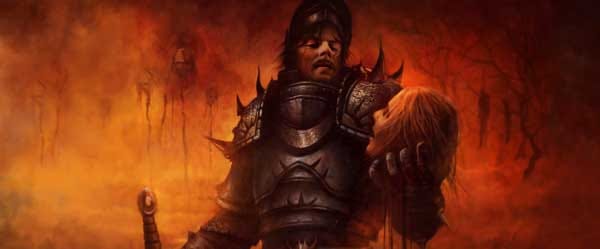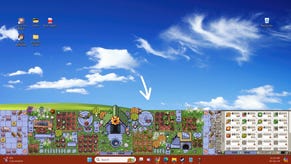Wot I Think: King Arthur
Neocore's new "Role-playing Wargame", King Arthur, has been available for a couple of weeks now, and I've been sinking a surprisingly large amount of time into it. It's a little bit Total War, a little bit fantasy, and a little bit unlike anything else out there. Read on for a round-table discussion of wot I think...
At the broadest level, King Arthur looks like a Total War game set in a fantasy universe. The action steps between a turn-based map of Britain, and real-time battlefield strategy maps in which you control your units from an omniscient camera in the sky. So far, so Medieval, but this is very much its own game: the field of battle is littered with fantasy units - translucent alien elf-things, giants, ludicrously armoured warriors, and generals who look like a cross between Sauron in armoured form, and a Power Ranger. There's also an arsenal of magic spells to be accessed via an RPG-lite levelling up of your knights.
The campaign map for King Arthur tells a story - one of the return of ancient evil and the fate of man who wields Excalibur - and paints a picture of Britain that is half-myth, half-developer fiction, with a vague sprinkling of history and actual geography in the mix. The Roman city of Virconium is mentioned, for example, as one of Arthur's possible capitals. They've done some research, and really not taken it very seriously. This is maximalist absurdo-fantasy with lightning wielded by god-generals, and faerie armies in the forest.

Anyway, what is most interesting about King Arthur is the sheer amount that's going on in that campaign map. It's turn-based, with limited action range for your armies, each of which must be led by a knight. England is broken up into many smaller kingdoms, each ruled by its own kings, as well as a spooky forest of death to the north. The year is divided into four seasons, too, each one of which is a turn. In winter you don't get to move or fight, but that's when you level up units and knights, and also when you receive your resources from your vassal regions.
Quests appear as you play, and these amount to a number of different scenarios which may or may not involve a visit to the battle map. Sometimes they're diplomatic situations in which you can trade precious artifacts, gold, food, or even women for a winning move. Other scenarios are brief text-tree adventures, where you explore a number of options and either talk your way past a fight, or cause a fight to kick off, resolving either way with a mission complete. Quests spring up constantly, and demand that you solve issues between warring kings, or save lost travellers, or investigate weirdness in the great northern forest, and so on. They all earn you money, XP, and occasionally new units. (I've just bagged me some giants, for example.) These missions can also change your morality, and that has a deep effect on your army. Righteous knights won't want to fight under a tyrannical general, and having giants alongside humans can reduce morale for the entire army.
The big morality board is a fun thing, and it slowly impacts more and more on your decisions. It's a graph with "Old Faith" To "Christian" on the X axis, and "Rightful" and "Tyrant" on the Y-axis. Your decisions in quests slowly move you across this chart, and will have some influence on what spells you are able to unlock, and what factions will be favourable toward you. I'm going to have a rather different experience aiming for Rightful Old Faith than someone aiming to be a Tyrannical Christian would have.

All this missioning is undertaken by a series of knights that you - as Arthur, who isn't a character in the game as such, but who appears to be omnipresent, and also has a portrait-shot like Jesus - must keep at the round table. If you choose to suffer major failures (and don't just reload, as I have been doing) you can lose knights from the roster entirely, and if you run out of knights, then it's game over. Knights can die in combat, too, which makes things doubly dangerous.
So yes, this campaign map is a splendid thing. Beautiful, detailed, and providing multiple levels in which you must manage your realm as you extend your reach across the country. It's a shame this doesn't allow for some more traditional base-building and tech-treeing, however. You can't, for example, do much to grow the soldier output of your kingdom. I've basically reached in impasse in my current game where I need cavalry. None of my towns supply cavalry. What can I do? Nothing. Actually, there is something. You can research new units once you can capture a capital city, something you don't have to do immediately and won't necessarily do for many hours if you didn't realise it was the most essential thing in the game. I didn't attempt it at first, thanks to how tough the defending armies were, consequently making my experience even harder. That's probably partly me being stupid, but also the game hiding what was crucial to progress.
Worse, however, is that the combat in the real-time maps is clumsy, and occasionally frustrating. The terrain is beautiful, but it lacks the clarity of other, rather more accomplished RTS games. More feedback about what units are doing, where they are, and what condition they are in is definitely required. Archers are absurdly over-powered, too, so much so that there's actually a tick-box option in the game for "weaker archers". Having seen entire armies decimated by just a couple units of archers, I have decided it might be time to tick that box. Why they are this powerful by default is baffling. Cavalry die within seconds of coming into range of even basic archers, and the side with a good combination of cavalry and massed archers will pretty much win every time. Except when there's a super-unit on the field that kills everything else, of course. Balance, it seems, is a bit off.

What King Arthur also does with it's real-time game, which isn't entirely helpful, is provide "victory locations" at points across the landscape. These can earn you a win if they're captured and held for long enough. It's bizarrely stacked against you if, however, as you don't seem to able to get hold of much in the way of cavalry. To get the locations quickly, you need horse-speed. But by the time my infantry-heavy armies have taken one location, an enemy with just a couple of cavalry units has won the battle, even if I held the field with soldiers.
This is especially galling when you're watching the last enemy on the field die and then DEFEAT pops up in front of you. Oh, they tagged all the victory locations, even though I captured their general and killed every other man on the field. (Nor does the AI seem to handle the concept of these locations particularly well. It will move to capture locations, but often won't think the recapture locations it's just a few yards from if you've swept through and recaptured it at some point in the battle.) What grates most about this is that it seems like an easy fix: force the capturing side to keep units in the vicinity of a capture point, or have the capture "run down" as the game goes on, or something like that.
Most battles I've experienced thus far have been decided by direct confrontations, but the fact that you can lose purely because you were too slow to tick a number of flags is basically rubbish, and leads to just getting the biggest army you can to auto-resolve the battle in your favour. Worse, the campaign delivers fairly incoherent objectives after the first couple of hours, so that you'll regularly run into objectives that are too hard for you to take on, forcing you to reload repetitiously.

All of which grumbling leads me to some other issues with the game: the rough edges throughout. I've had a couple of very strange bugs appear, the most lethal of which was soldiers unable to finish a fight on the field, despite having killed all the enemy, and becoming stuck in place. My entire army became lodged in this state, and I had to restart. Other King Arthur players have complained about crash bugs, but I've found it to be fast and very stable indeed. The one other key problem I had with it was the apparent failure to explain recruitment, which is done on the army screen when an army is in a recruitment-friendly settlement. It's not complicated, it just wasn't immediately explained, and that's happened with a few other aspects of the game as I've explored it. There is an air of lavish craftsmanship here that's sullied by a few splinters in the finish. It's just not quite smooth enough.
That's not to say I haven't been enjoying my time with the game: the effort is mostly commendable. From the little text-adventure side quests, to the heavily decorated battlefields, it's a hugely interesting campaign to get through. The art-style is fantastic too, delivering a world littered with gothic towers, dragon-skeletons and sinister bogs. Neocore have evidently enjoyed creating this grim Arthurian fantasy, and it shows in everything from the big spikes on shoulder-pads, to the misty intricacy of the campaign map. That shines through in the game you end up playing.
Nevertheless the uneven real-time experience and occasional random spikes in difficulty is what's holding me back from recommending this. There is a substantial and interesting game here, but I've not found the tactical challenge to be coherent and fluid enough to stand up without a comprehensive overhaul and rebalancing.
King Arthur is out now on Steam.









